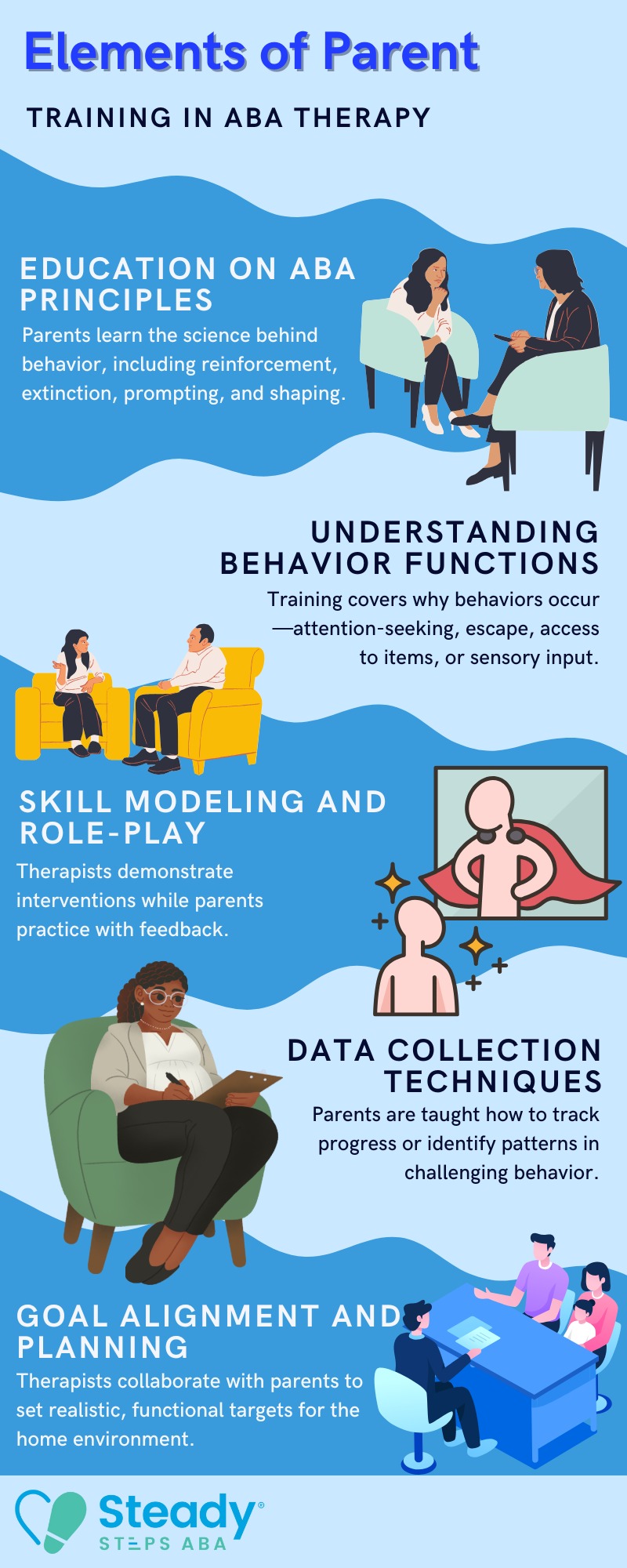Key Points:
- Parent training in ABA therapy equips caregivers with strategies to support consistent behavior change outside clinical settings.
- Understanding reinforcement, prompting, and behavior tracking is essential to extending therapy into daily routines.
- Collaboration between parents and behavior analysts strengthens progress and long-term outcomes for children with autism and other developmental conditions.
Raising a child with autism or other developmental challenges often means playing multiple roles—caregiver, teacher, advocate. A vital but sometimes overlooked component of support is parent training in ABA therapy, where caregivers learn practical tools to extend learning beyond sessions. This structured training enables parents to reinforce behaviors, manage challenges, and help their children thrive at home and in the community.
Parent training is not just a bonus in Applied Behavior Analysis—it’s essential. In fact, studies show that parent involvement can significantly enhance a child’s skill acquisition and behavior improvement. By giving parents the knowledge and confidence to implement behavior strategies, ABA providers make progress more consistent and meaningful.
What is Parent Training in ABA Therapy?
Parent training in ABA therapy involves teaching caregivers to use behavior strategies at home to reinforce skills taught during ABA sessions. This includes understanding the ABCs of behavior (Antecedent-Behavior-Consequence), using reinforcement, prompting appropriately, and managing challenging behaviors effectively.
Training typically includes both educational and hands-on components. Parents may attend workshops, review materials, observe therapy sessions, and receive coaching to implement strategies in real-life settings. The goal is to create consistency between the clinic and the home, helping children generalize new skills and reduce behaviors that interfere with learning.
Why is Parent Involvement So Important in ABA?
ABA therapy typically occurs for a few hours each day, but parents and caregivers are with the child most of the time. Without follow-through at home, skills may not stick, and behavior patterns can return.
When parents are actively involved:
- Skills generalize more effectively: Children practice new behaviors across environments.
- Progress is faster and more sustainable: Reinforcement continues outside therapy.
- Behavior plans are more realistic: Parents help shape goals that align with daily life.
- Families feel empowered: Caregivers are confident in handling difficult moments.
ABA is most successful when it’s a team effort—therapists guide and model, but parents carry it through in daily routines.
What are the Core Elements of Effective ABA Parent Training?
Every training plan should be tailored to the family’s unique needs, but certain core components are commonly included. These elements help parents build foundational skills to support their child consistently.
Here are the critical features of quality ABA parent training:

This structured approach helps build both knowledge and confidence in the caregiver.
What Skills Can Parents Learn from ABA Training?
Parents can learn a range of practical skills from ABA (Applied Behavior Analysis) training that help support their child’s development and manage challenging behaviors at home. These include behavior management techniques, positive reinforcement strategies, and ways to increase communication and independence.
Parents are also taught how to collect data, follow behavior intervention plans, and promote skill generalization across daily routines. By gaining these tools, parents become active participants in their child’s progress, helping to create consistency between therapy and home life while fostering long-term success.
How Can Parents Stay Consistent with ABA Strategies?
Consistency is one of the biggest challenges for families, especially when multiple caregivers are involved. A well-designed ABA parent training program addresses these obstacles by offering tools and systems to maintain fidelity.
To stay consistent, parents can:
- Use written behavior plans or cheat sheets to remember steps.
- Attend regular check-ins or coaching sessions with the ABA provider.
- Create a daily routine that integrates strategies naturally.
- Practice during low-stress moments first, then move to harder situations.
- Use reinforcement for themselves too—celebrate small wins.
A strong therapist-parent partnership ensures that when things go off track, they can be course-corrected quickly without judgment.
What Challenges Do Parents Face During Training—and How Can They Be Addressed?
ABA training isn’t always easy. Parents come in with different backgrounds, stress levels, and time constraints. Some may feel overwhelmed by the terminology or discouraged by slow progress. A good ABA program acknowledges these realities and adjusts support accordingly.
Common challenges include:
1. Time Limitations
Parents with busy schedules may find it difficult to attend sessions consistently or practice new skills daily. Solutions include offering flexible training times, remote coaching options, and prioritizing high-impact strategies to maximize efficiency.
2. Emotional Fatigue
Caregivers managing ongoing stress or burnout need emotional support alongside training. Providing encouragement, peer support groups, and mental health resources helps maintain their well-being.
3. Conflicting Advice
When family members, educators, or therapists suggest different approaches, parents can feel confused or pulled in multiple directions. Clear communication and collaboration among all parties promote consistency and reduce conflict.
4. Cultural Mismatches
Sometimes, ABA strategies may not fully align with a family’s cultural values or parenting styles. Respectful dialogue and adaptation of methods ensure training fits the family’s unique context.
5. Fear of Doing It Wrong
Parents may hesitate to implement techniques without feeling fully confident, fearing that mistakes might harm progress. Ongoing coaching, positive feedback, and patience build competence and trust over time.
Understanding and adapting to each family’s unique situation is key to a successful parent training experience.
How Can Parent Training Improve Long-Term Outcomes?
Parent training in ABA therapy equips caregivers with the skills and knowledge to consistently support their child’s learning and behavior outside of clinical settings. This consistency helps reinforce positive behaviors, encourages skill generalization across environments, and reduces challenging behaviors more effectively.
By empowering parents to implement strategies confidently, parent training fosters stronger communication, independence, and social skills over time. Engaged and informed caregivers become active partners in therapy, improving the child’s long-term developmental progress and overall quality of life.
How Can Families Maximize the Value of ABA Parent Training?
Getting the most from parent training involves active participation and clear communication with the ABA provider. Parents don’t need to become experts overnight, but engagement makes a measurable difference.
To maximize impact:
Be Transparent
Share honestly about your child’s behaviors, challenges, and what’s working or not. This openness allows therapists to tailor goals and strategies that fit your family’s real-life context.
Ask Questions
Don’t hesitate to seek clarification or ask for practical examples. Understanding the “why” and “how” behind techniques makes applying them more effective.
Take Notes or Record Sessions
Documenting training sessions, whether by note-taking or recording (with permission), helps reinforce learning and provides a valuable reference when practicing independently.
Share Progress Honestly
Celebrate successes and communicate struggles openly. ABA is an evolving process, and honest feedback guides ongoing adjustments.
Practice Regularly
Even short, consistent practice sessions can make a big difference. Repetition builds skill retention for both parents and children.
When families view ABA parent training as a shared journey—not just a clinical requirement—the results are more meaningful and sustainable. This same collaborative spirit can also be applied when exploring ways to support autistic adults in daily life—Looking for Autism Activities for Adults? Start With These.
Nurture Your Child’s Growth with ABA Therapy
Parent training in ABA therapy is a powerful tool that turns everyday moments into learning opportunities. It gives caregivers the techniques and support they need to promote meaningful change. At Steady Steps ABA, we specialize in ABA therapy in Maryland, guiding families through hands-on, personalized parent training designed to support long-term progress.
Our compassionate team works closely with parents to ensure ABA strategies are practical, consistent, and aligned with the family’s goals. Whether you’re starting your ABA journey or looking to deepen your role in your child’s development, we’re here to help every step of the way.
Contact us today to learn how our ABA therapy in Maryland can make a difference in your child’s life—and yours.






